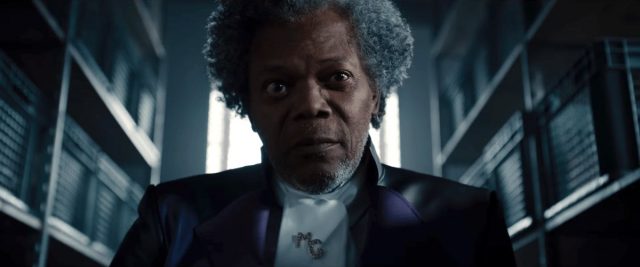Glass: A Paneful Experience, by Tyler Smith

There are days when it can be difficult to be a film critic. Sometimes a movie comes along that fails on so many levels that to talk about any of them feels inherently insufficient. The way each failure feeds into another makes for a rich tapestry of dissatisfaction; something so fully realized in its incompetence that it is actually difficult to parse out the various choices that led to such a frustrating filmgoing experience.
It may sound strange, but only the best directors are able to achieve such dizzying heights of awfulness. Lesser filmmakers often lack both the ambition and talent to make transcendently bad movies; their films are often produced and released with very little fanfare, and forgotten within minutes of being seen, both by audiences and critics. It takes a real visionary to put together a movie so memorably terrible that it sticks with the viewer, but M. Night Shyamalan has certainly shown himself more than capable of doing just that. With his recent films The Visit and Split, many – including myself – were heralding a return to form for the director of The Sixth Sense. But now comes Glass, a film every bit as stupefying and meandering as Shyamalan’s worst efforts. To analyze the film is to walk down a long, winding road, only to find oneself right back at the beginning. No progress, just confusion.
The potential was there, as was audience anticipation. The post-credits scene of Split revealed that Shyamalan was eager to dip his toe into the “cinematic universe” pool of Marvel and DC, as the characters from that film were seen existing in the same world as those of Shyamalan’s 2000 film Unbreakable. The prospect of a shared universe with all-original characters was certainly exciting, especially when one considers the groundwork laid so firmly in Unbreakable.
But it would appear that Shyamalan, moving far from the intimate, moody atmosphere of this first film and turning away from the schlocky fun of Split, has fallen back into his Lady in the Water instincts, spending too much time developing the mythology and not nearly enough on character or story. The result is a film that often comes to a grinding halt in order to explain the rather lofty themes that, even when spoken in hushed tones, are still a little silly.
Perhaps the primary issue – as it is so often with sub-par films – is the structure. After a promising beginning pitting superhero David Dunn (Bruce Willis) against split-persona The Horde (James McAvoy), the action quickly moves to a mental institution, where Dr. Staple (Sarah Paulson) attempts to explain to these men that there is nothing super about them; they are simply delusional. This hospital also houses Mr. Glass (Samuel L. Jackson), the would-be supervillain of Unbreakable. With these three together, one would expect sparks to fly, but it never happens. Instead, we get a David that is tight-lipped and a Glass that is under heavy sedation, leaving us only with Dr. Staple doing most of the talking and poor Sarah Paulson to do most of the heavy lifting, delivering long monologues that are specifically designed to make the audience incredulous.
When the confrontation finally does arrive, it is so lackluster and poorly-conceived that it feels as though Shyamalan didn’t actually have a plan; like he was so focused on declarations of theme that he forgot to write a climax. And after the action has died down, there is an eventual twist that feels so tacked-on and ill-defined that I defy anybody watching to feel any real investment in it.
The actors do what they can – with a very enthusiastic McAvoy giving 2,530% (that is, 110% for each personality) – but they’re only occasionally given something they can really do anything with. It is a pleasure to watch Jackson emerge from his stupor and become the verbose villain that Glass was always meant to be, but it comes so late in the film that we have very little time to actually enjoy the scenery-chewing.
And I wish I could say something nice about Bruce Willis, but he looks completely disinterested in the proceedings. Willis used to be a vibrant, exciting actor to watch, but he hasn’t put any effort into his roles in years, with 2012’s Looper and Moonrise Kingdom being exceptions that prove the rule. While we are told that David Dunn has experienced loss since we last saw him, the sleepy-eyed, barely-audible line readings that Willis gives us seem less informed by world-weariness and more by general boredom. It is a weak, forgettable performance, swallowed up by the rest of the cast, who at least appear to be having fun.
If only the film were dictated more by the tone of the actors, we might have something very special on our hands. Instead, we have a script that feels very much like a first draft, with long passages of dialogue that the director apparently deemed too precious to remove, bogging an already-sluggish script down in an endless lecture about the importance of comic books. And, in the meantime, we get no real character development, and a story that wanders aimlessly, like a kid lost in a shopping mall.
It could be said that the film is a product of Shyamalan’s self indulgence; the refusal to rein himself in. Clearly, these ideas are interesting to him, and he assumes they will be interesting to others. He’s not necessarily wrong, but he seems to have forgotten – like so many other well-meaning directors before him – that thematic intention will only carry him so far. The audience, so eager to embrace this film, still wants to be engaged; welcomed back into the Unbreakable world after almost twenty years. Instead, Shyamalan keeps us at arm’s length while he prattles on and on.
M. Night Shyamalan is a very good director. He is sometimes even great, evoking the ever-elusive Hitchcockian tone in some of his better films. But, as is so often the case with great directors, he is perhaps too in love with his own interests. He is obviously fascinated by so many things that he often lacks the focus required to condense them all into one coherent story. Sometimes, though, we get films like The Sixth Sense or Signs; movies in which his own leanings take him in a surprisingly specific direction, and the result is a fantastic, poignant, memorable work of art. But more often, though, we get films like Glass; so disorganized, so directionless, so baffling.
I have no doubt that Shyamalan has another great movie or two (or maybe even three) in him, but to make them will require more restraint than the director exercises in Glass; a movie with limitless potential completely squandered by its creator.






























I haven’t seen the movie, but I know Shyamalan. A line stuck with me that one reviewer once said: “Let’s face it- M Night Shyamalan is an idiot.” Maybe to be more specific- he’s obsessed with the ideas and meaning behind a movie, and can’t (or won’t) simply make a crowd-pleaser. I don’t know if he doesn’t know how, or just doesn’t want to. This movie was handed to him. It should have been a breeze. All he had to do was make something exciting and entertaining. He didn’t need to “subvert audience expectations”. As another reviewer said, we already know (from the previous two movies) that these characters have powers. So we’re just not interested in the idea that they don’t. Idk what the twist is, but does Shyamalan not know what the idea of a “crowd-pleaser” is? Is it beneath him to just make a “regular movie”? Movies are supposed to be fun and enjoyable, not sermons. It’s the same mistake that the Wachowskis made with the Matrix sequels. They already had a fantastic set-up; all they had to do was give the audience what they wanted. But no, it’s like they had to reinvent the wheel each time, apparently thinking that their philosophizing was sooo important. …Anyway, I’m glad you mentioned “Signs”. That was Shyamalan’s true crowd-pleaser. In fact, everything up to “The Village” was acceptable. But ever since then, he’s had his head crammed firmly up his ass. His movies have always had a “message”, but starting with LITW, the message seems to be more important to him than making an entertaining movie. (“Split” seems an exception.) He has good ideas and makes good moments, but just imagine what this movie could have been if he had gotten off his high horse, and listened to some input from other people.
(But… idk really. I don’t know how much could have been done with these 3 characters. It’s just… if the trailer advertises an exciting action movie, it should really be that.)
Interesting take. I’m not sure if I completely agree. I’m less interested in directors who give audiences what they want so much as giving the characters what they need. I’d be fine with Shyamalan neglecting the former if he had done the latter.
-Tyler
Thank you Tyler for capturing 99% of my issues with “Glass”. I went in wanting to at least have a good time, but instead was bored out of my mind. Shyamalan completely lost his way with this film and never seemed to even care if the audience was invested. McAvoy, Paulson, and Jackson did their best but this was too heavy for them to keep it afloat. Swing and a BIG miss!
This. All of this. All of it was how I felt about the movie. It was boring and overly-talky and I feel like McAvoy for sure had to carry this sub-par film on his back. It wasn’t even fun to watch. Bruce Willis hasn’t been engaged or engaging for a long time and it’s tiresome. Thank you for a spot on review.